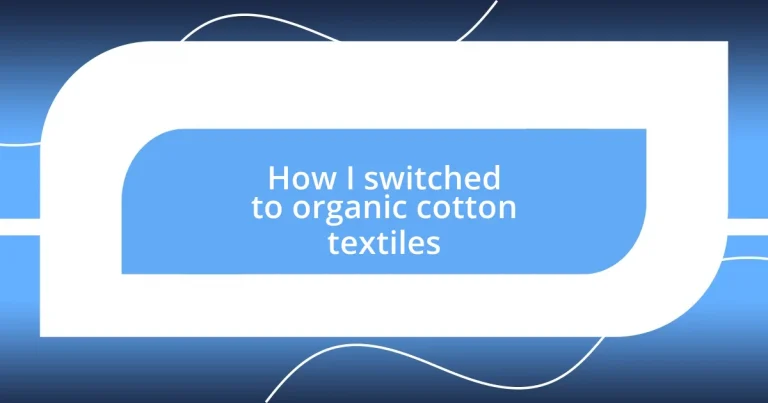Key takeaways:
- Choosing organic cotton textiles benefits personal health, the environment, and supports sustainable farming practices.
- Quality indicators for organic cotton include certifications (like GOTS), feel, thread count, and natural dyes.
- Effective care for organic cotton involves cold water washing, air-drying, and avoiding fabric softeners to maintain fabric quality.
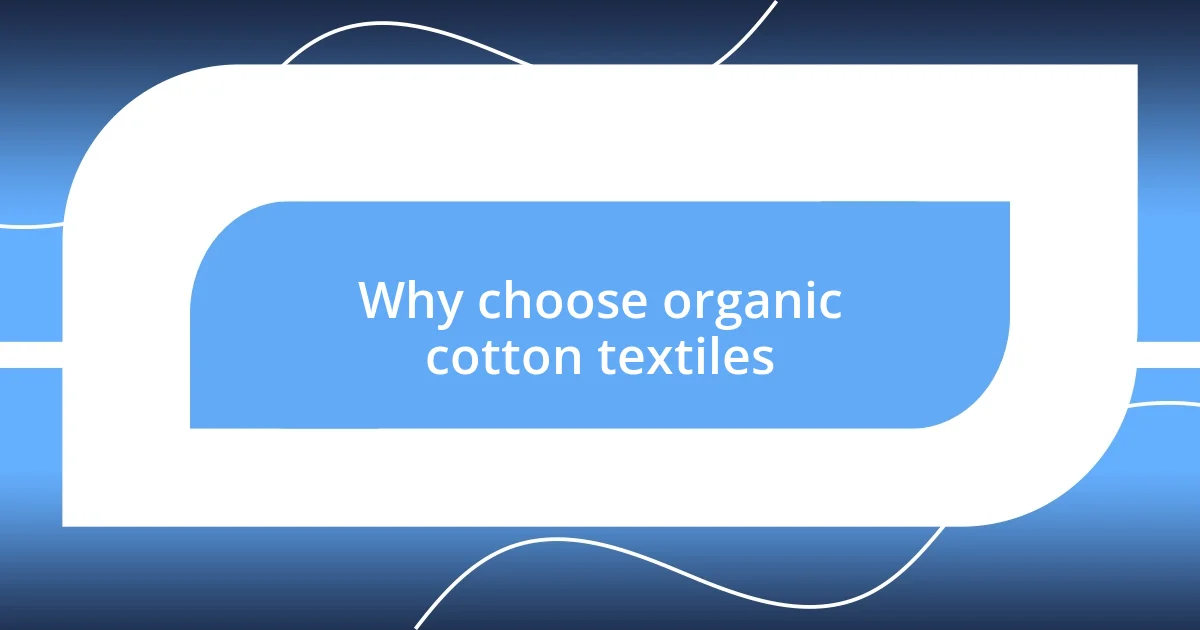
Why choose organic cotton textiles
Choosing organic cotton textiles is like investing in a healthier future for both ourselves and the planet. I remember the first time I unwrapped a soft, organic cotton blanket; the difference was astonishing. It felt so gentle against my skin, free from the harsh chemicals often used in conventional cotton farming. Doesn’t it make you wonder why we would want anything less?
One of the most compelling reasons to make the switch is the environmental impact. Organic farming practices reduce water usage by 91% compared to conventional methods, which I found truly alarming. I often think about how much water we waste daily. Transitioning to organic cotton means supporting farming methods that protect precious water resources.
Beyond the eco-friendly benefits, organic cotton is simply better for our skin. I once had a reaction to a non-organic cotton shirt that left me feeling itchy and irritated all day. After switching to organic, I noticed a significant improvement in comfort. Have you ever experienced that discomfort from clothing? Choosing organic cotton textiles not only enhances our personal well-being but also aligns our choices with a sustainable lifestyle.
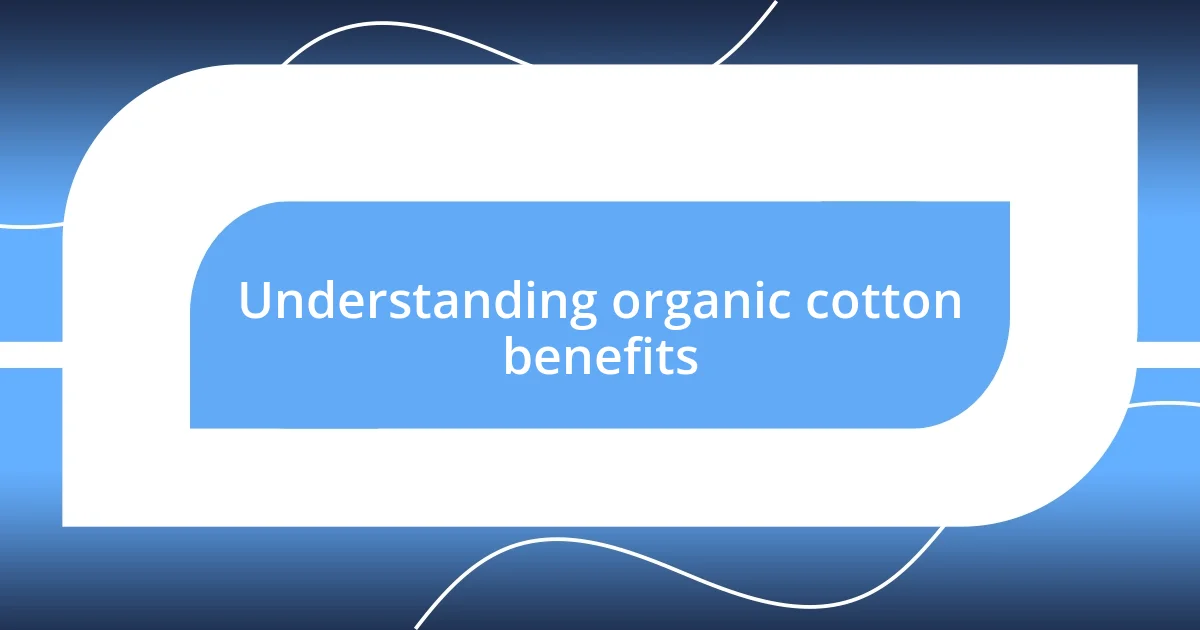
Understanding organic cotton benefits
Understanding the benefits of organic cotton is a journey of discovery. For instance, I was amazed to learn that organic cotton farming supports biodiversity by avoiding harmful pesticides and fertilizers. When I first visited an organic cotton farm, I couldn’t help but notice the vibrant ecosystem thriving in the fields. It felt refreshing to be in an environment where nature was celebrated rather than suppressed.
Another significant advantage of organic cotton is its durability. I recall purchasing a conventional cotton T-shirt that faded after just a few washes. In contrast, my organic cotton garments have stood the test of time, maintaining their softness and color far better. Isn’t it rewarding when the clothes you love also become long-lasting companions in your wardrobe?
Finally, let’s not overlook the ethical dimensions. Choosing organic cotton means supporting fair labor practices and healthier working conditions for farmers. During a talk with a local organic farmer, I realized the pride they take in their work and the positive impact it has on their community. Have you thought about how your clothing choices can create a ripple effect?
| Aspect | Organic Cotton |
|---|---|
| Environmental Impact | Fewer pesticides and reduced water usage |
| Durability | Longer-lasting with better color retention |
| Ethical Production | Support for fair labor practices |
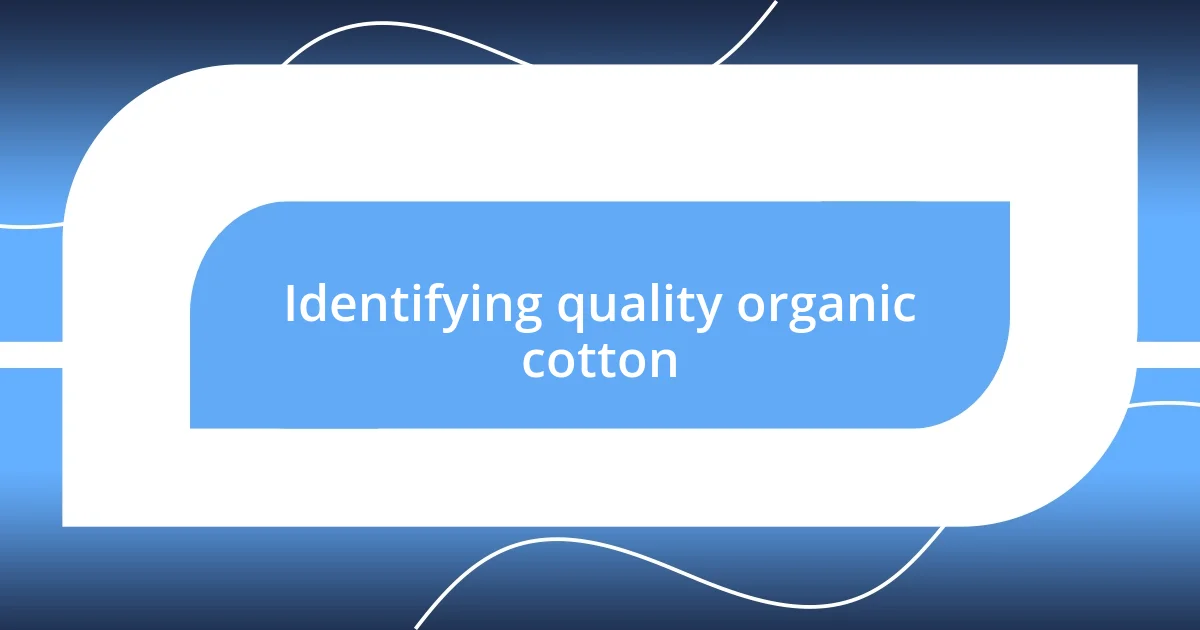
Identifying quality organic cotton
Identifying quality organic cotton can sometimes be challenging, given the market’s vast array of options. However, I’ve learned to look for specific indicators that truly reflect quality. For instance, I always check for certifications like GOTS (Global Organic Textile Standard) on the product label. This certification means the cotton has been grown and processed according to strict environmental and social criteria, giving me confidence in my purchase.
To effectively evaluate the quality of organic cotton textiles, consider these key aspects:
- Feel: High-quality organic cotton should feel soft and smooth against your skin, rather than coarse or stiff.
- Thread Count: A higher thread count generally indicates better quality, resulting in a denser and more durable fabric.
- Certifications: Look for reputable certifications, such as GOTS or OEKO-TEX, which signify adherence to organic standards and free from harmful substances.
- Color and Dye: Natural dyes are often used in organic cotton. If the colors look vibrant and rich without any harsh chemicals, you’re on the right track.
- Breathability: Quality organic cotton is breathable, helping with moisture control and comfort, especially during warmer weather.
While I was browsing for organic cotton sheets, I remember being drawn to a particular set that had a soft, inviting texture. As I ran my fingers over the material, I felt a warmth and authenticity that just felt right. That moment solidified my belief that quality is not just about the product itself but also the experience it brings.
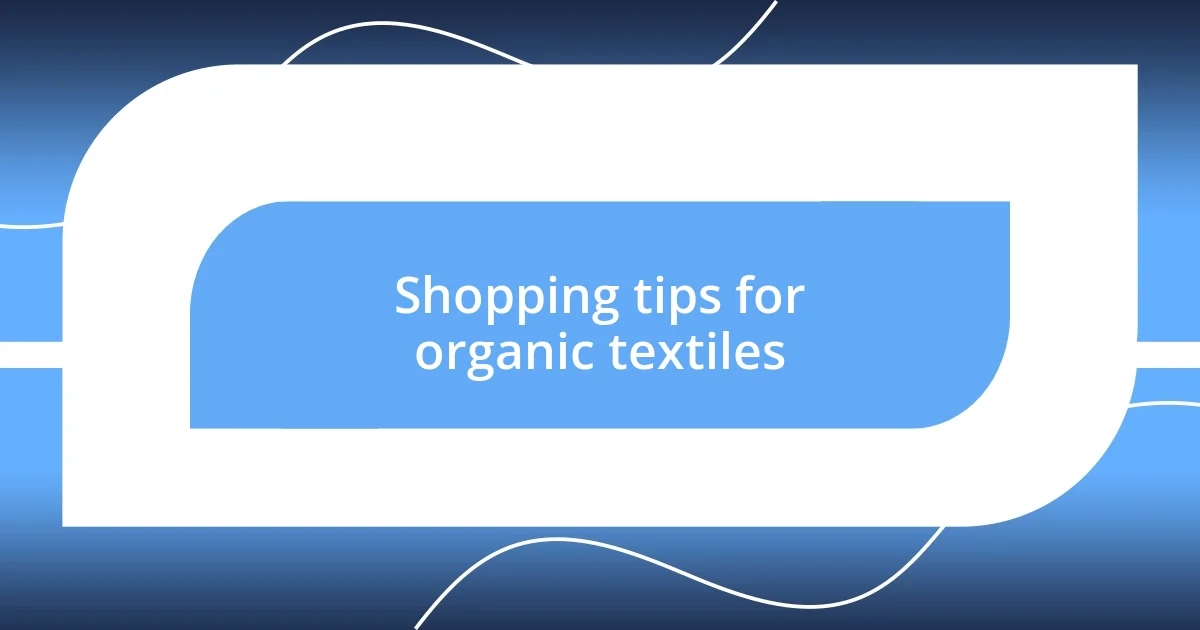
Shopping tips for organic textiles
When shopping for organic textiles, I’ve found that understanding the supply chain can make a significant difference. Always inquire about the origins of the product. When I learned that a beautiful, cozy blanket I loved was sourced from a small, local farm, it felt like I was not just buying a product but supporting a community. Isn’t it satisfying to know your purchase contributes to something greater?
Additionally, I recommend prioritizing versatility in your choices. For instance, when I first started buying organic cotton, I splurged on a pair of pants that seemed great for lounging around the house. But as time passed, I discovered they were just as stylish for outings. Every time I wear them, I’m reminded of the rewards that come from making thoughtful choices.
Finally, patience is key. Organic cotton items can sometimes take longer to become widely available, especially if you’re eyeing a specific style or color. When I waited a few extra weeks for a custom organic cotton dress, it was tough—but the anticipation made the moment I finally wore it all the more special. Have you ever felt that thrill when it pays off to wait for something you truly love?

Sustainable brands to consider
When exploring sustainable brands for organic cotton textiles, I’ve discovered some real gems that truly embody eco-friendly practices. One brand that stands out for me is Pact, known for its commitment to fair trade and giving back to the community. When I received my first pair of their organic cotton leggings, I was pleasantly surprised by their incredible softness and comfort. It’s amazing how wearing something that feels good can turn into a small act of kindness for the planet, don’t you think?
Another brand that I love is Eileen Fisher. They not only focus on organic materials but also prioritize sustainability at every stage. I still remember the blissful feeling I had when I wore one of their organic cotton tees—it’s like wearing a gentle hug against my skin. Further, their take-back program for worn garments emphasizes a circular economy, and that philosophy really resonates with me. How can we not appreciate brands that take responsibility for their impact on the planet and our lives?
Lastly, Bamboo Cotton Co. deserves a mention. Their unique blend of bamboo and organic cotton offers a luxurious feel while still being gentle on the environment. I was initially skeptical about mixing fabrics, but when I finally tried their sheets, I was blown away by how cozy and breathable they were. Isn’t it fascinating how sometimes stepping outside our comfort zone leads to delightful surprises? By choosing brands that reflect our values, we’re not just shopping; we’re embracing a lifestyle that contributes positively to our world.
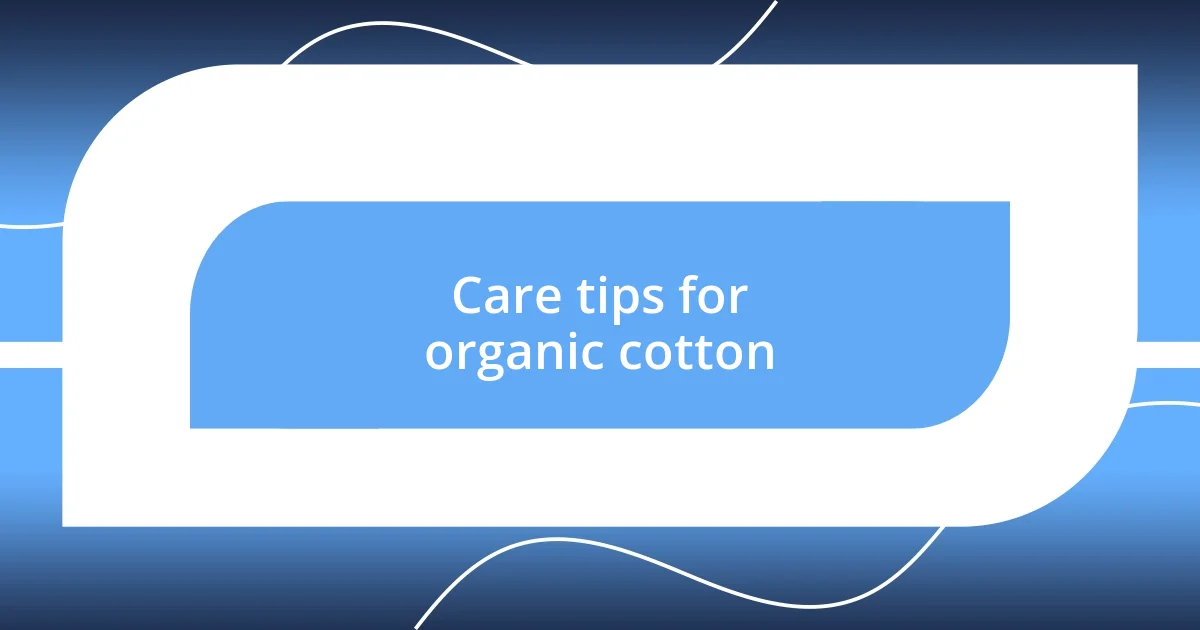
Care tips for organic cotton
Taking care of organic cotton textiles is surprisingly easy and rewarding. I always opt for cold water washing, which not only helps preserve the color but also reduces energy use. It struck me how small changes can lead to a more sustainable lifestyle, like when I switched to using a gentle detergent that was biodegradable. Have you ever noticed how much fresher your clothes smell when you choose better products?
Drying organic cotton items can also make a big difference in their longevity. I usually hang my organic cotton pieces instead of using a dryer, and I can feel the fabric’s quality stays intact. There’s something charming about watching them sway in the breeze; it reminds me that I’m caring for something precious. Have you tried air-drying your clothes? You might find it quite meditative.
One tip that I swear by is avoiding fabric softeners. I learned the hard way that these seemingly harmless products can coat the fibers and reduce the breathability of organic cotton. I remember the first time I skipped the softener—I was nervous, but the result was a wonderfully soft fabric without any unnecessary chemicals. Isn’t it amazing how simplifying our choices can make such a positive impact on our health and the environment?

Sharing your experience with others
Sharing my experience of switching to organic cotton textiles has been incredibly rewarding. I often find myself chatting with friends and family about why I made this change. They often ask if it really feels different, and I share how the natural softness and breathability transform my everyday comfort. It’s like a little spark ignites when they see my enthusiasm—do you ever feel that rush when you talk passionately about something meaningful?
I’ve also taken to social media to document this journey. Posting pictures of my favorite organic cotton items created a dialogue with my followers, and it’s fascinating to see how many are intrigued by the sustainable choices I’ve made. I remember receiving a DM from someone who was inspired to try their first organic cotton purchase after seeing my post. Isn’t it amazing how sharing our journeys can ripple out and inspire change in others?
Additionally, I’ve hosted small gatherings where I showcase my organic cotton finds, turning it into an informal ‘eco-chic’ fashion show. As we sip tea, I delve into the stories behind each piece, and it almost feels like we’re sharing a new secret together. These moments remind me how significant our personal choices can be—have you ever wondered how your lifestyle choices might affect those around you?












